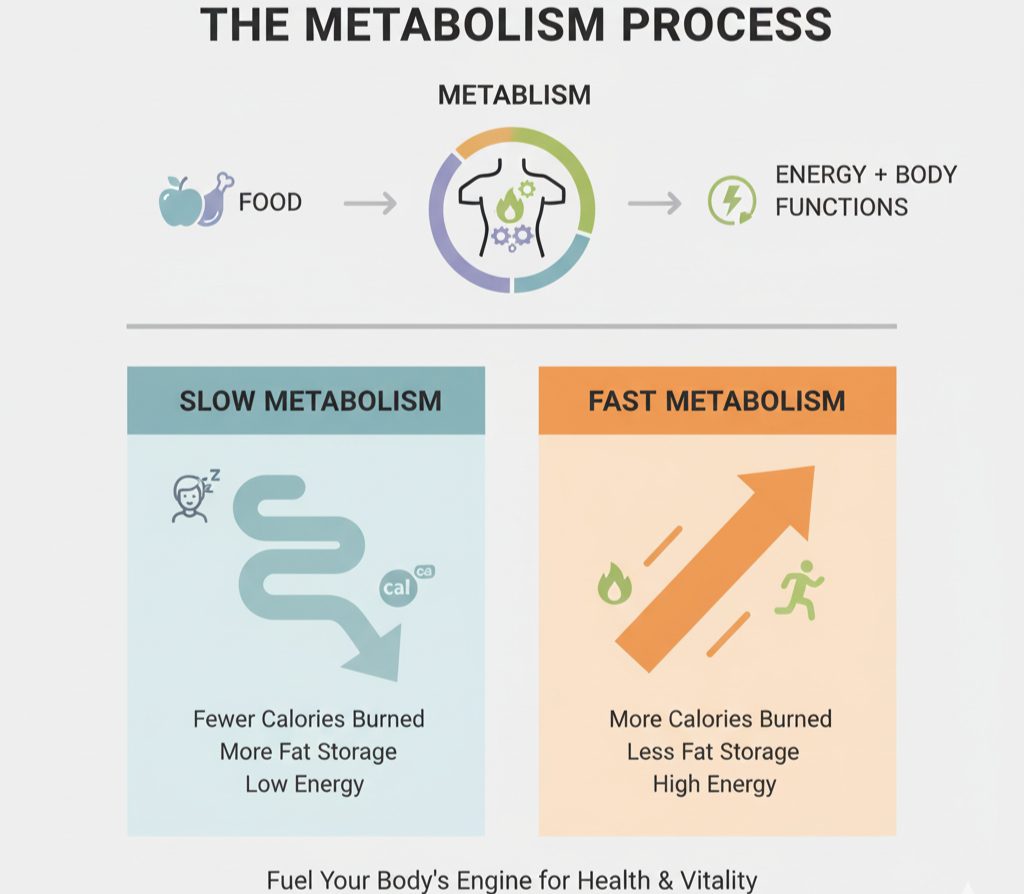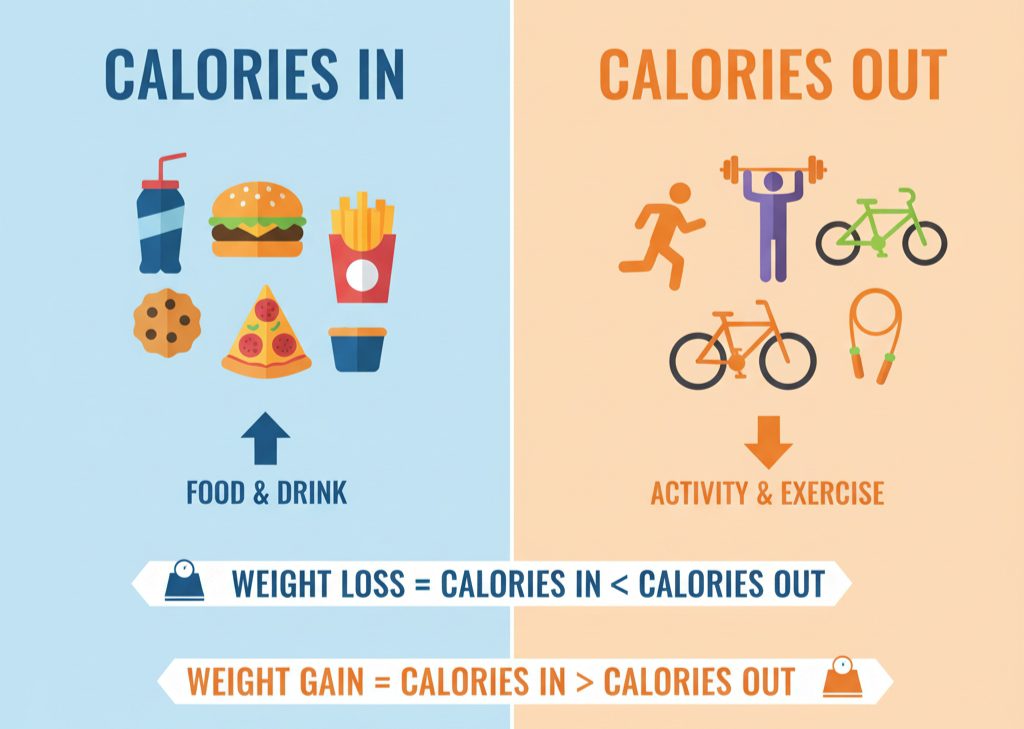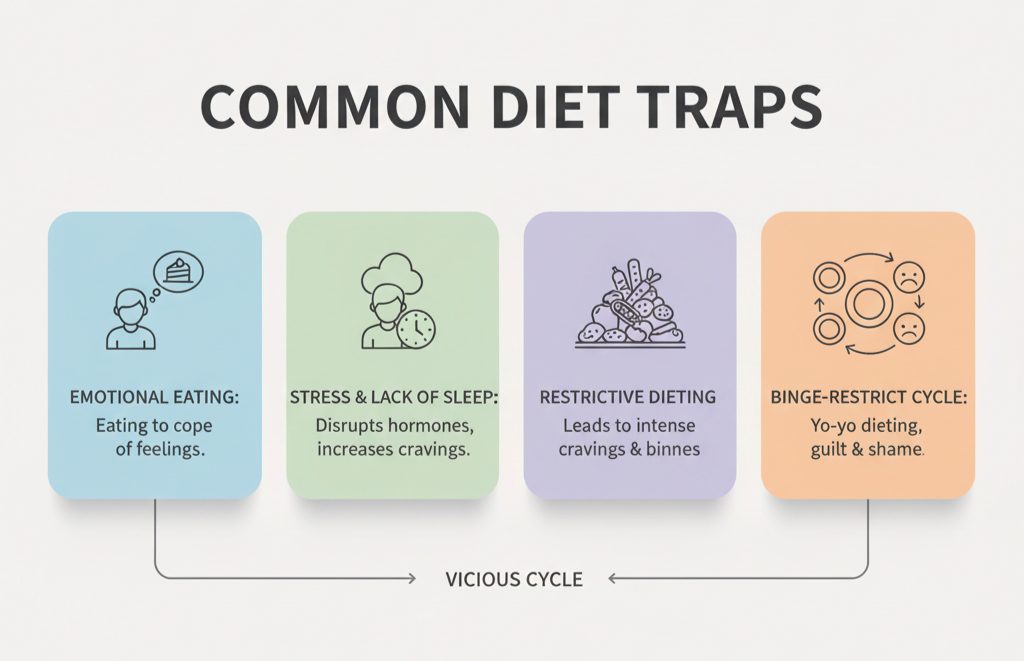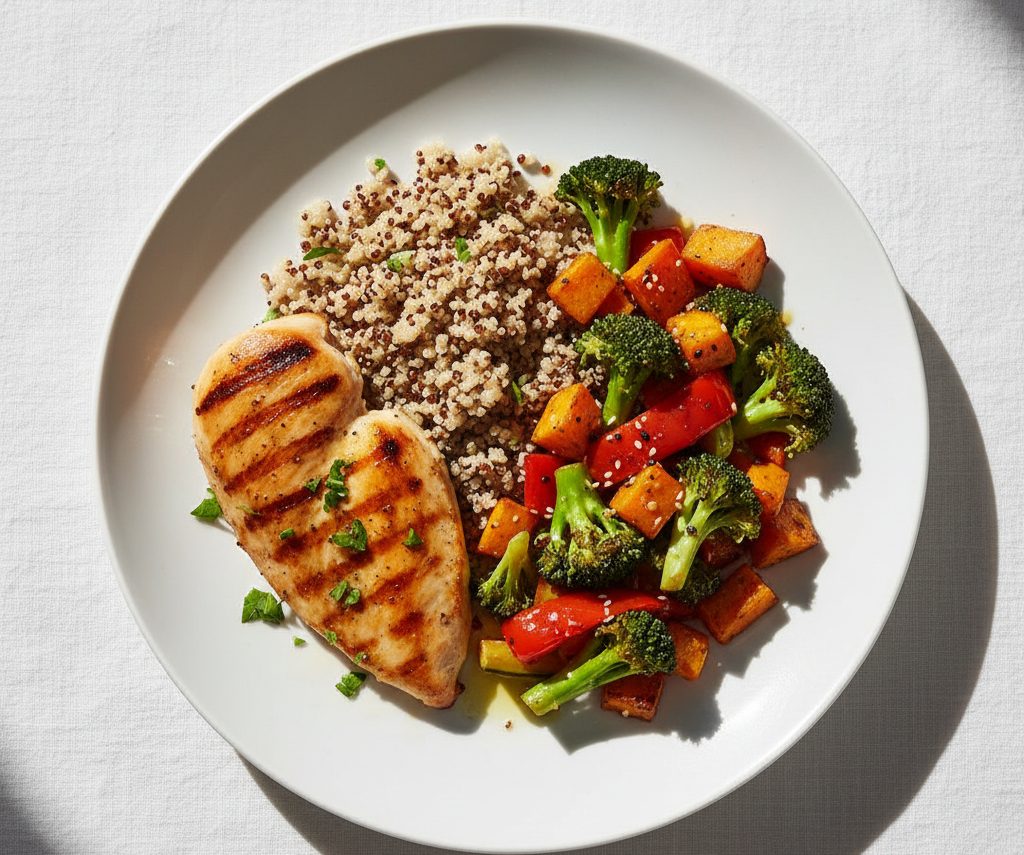Most people don’t “fail” diets — most diets fail people. Learn how your metabolism, calorie needs, hormones, habits and mindset actually control fat loss (not just willpower), and how to build a plan that lasts.
1. The Harsh Truth About Diets — Why So Many People Give Up
You're not the only one who has ever started a diet and quit after just a few days. Research shows that more than 80% of people stop following a diet within three months. It’s not because you’re lazy or weak. It’s because most diets fight against how your body and mind are designed to work, instead of working with them.
Diets usually begin with excitement. You stock up “clean” groceries, plan perfect meals, maybe even download a calorie tracking app. For the first few days or weeks you feel disciplined and in control.
Then: your energy drops. Cravings come back. The scale stops moving. You feel guilt and frustration. You think, “What’s wrong with me?”
Here’s what’s actually happening: when you cut calories too hard or remove entire food groups, your brain doesn’t interpret that as “dieting.” It interprets it as starvation. Your survival systems kick in. Hunger hormones go up. Metabolism slows down. You start craving high-calorie foods. That is biology — not weakness.
Then comes the “all or nothing” trap. One “bad meal” becomes “my diet is ruined,” which becomes “I’ll restart Monday,” which becomes binge–guilt–restart–quit. You’ve probably lived that loop.
On top of that, food is emotional. It’s comfort, culture, social bonding, reward. When you’re told “never eat this again,” it doesn’t just affect your stomach — it affects your mood, confidence, and identity. Restriction creates obsession. The more you tell yourself “no,” the more you want it.
- Your metabolism adapts to protect you from fast weight loss.
- Your brain rebels against constant deprivation.
- Your habits don’t change just because your meal plan did.
Real success doesn’t come from punishment. It comes from understanding how metabolism, calories, and behaviour work together — and building a routine around that.
2. Metabolism Myths That Make Dieting Harder
“My metabolism is slow.” “I need to speed up my metabolism.” We hear this all the time — but most people don’t actually understand what metabolism is.
Metabolism isn’t one thing. It’s the total of all processes that keep you alive: digestion, circulation, breathing, cell repair, hormone production. When people say “fast metabolism,” what they really mean is “my body burns energy easily,” and “slow metabolism” means “my body conserves energy.”
Here’s where diets break: when you drop calories too low, your body thinks food is scarce. It responds by slowing down energy burn to protect you. You feel tired. You burn fewer calories at rest. You hit a plateau. That’s why most people lose weight fast at first, then “get stuck.” Nothing is “wrong.” Your body simply adapted for survival.
Some believe they’re just “born” with a slow metabolism. Yes, your Basal Metabolic Rate (BMR) is influenced by things like age, sex, genetics, and muscle mass — but you’re not powerless. Building or maintaining muscle, staying active, managing stress, and sleeping properly all support a stronger metabolism.
You can check your personal baseline using the BMR Calculator on NutriFitCalc. It estimates how many calories your body needs just to function. When you know that number, you can choose a calorie target that supports fat loss without crashing your energy or metabolism.
Another myth: “magic” fat-burning foods or pills. Yes, caffeine and spicy foods can cause a tiny short-term bump in calorie burn — but no food or detox drink will “melt fat” overnight. The real metabolism boosters are not hacks. They’re habits: enough protein, daily movement, quality sleep, and stress control.
If dieting left you exhausted, obsessed, or stuck — your body wasn’t failing the plan. The plan was failing your biology.

3. The Calorie Equation — It’s Simple (But Not Easy)
Let’s be honest: “calories” is one of the most misunderstood words in nutrition. Some people obsessively count them. Others ignore them completely. But if fat loss is your goal, you do need to understand them.
The science is straightforward: If you consistently burn more calories than you take in, you will lose weight. That’s called a calorie deficit.
But living that in the real world? That’s the hard part. Calories are not just numbers. They’re habits. They’re feelings. They’re culture. They’re comfort. They’re stress relief. That’s why most people struggle with “eat less, move more.”
Your body burns calories 24/7, even when you sit. That baseline burn is called your Basal Metabolic Rate (BMR). Add daily movement and exercise, and you get your Total Daily Energy Expenditure (TDEE) — basically, how many calories you burn in a normal day.
You can estimate both with the Daily Calorie Calculator on NutriFitCalc. It uses your age, weight, height, and activity level to give you a realistic calorie target for fat loss, maintenance, or muscle gain.
Here’s why people still get stuck:
- We underestimate intake. “Just one cookie” or “just one latte” adds up fast.
- We overestimate burn. A 30-minute walk doesn’t erase a 2,000 calorie “cheat meal.”
- We treat all calories as equal. Yes, 500 calories is 500 calories — but 500 calories of fast food doesn’t fuel you the same way 500 calories of chicken, rice, and vegetables will. High-quality food controls cravings and energy swings.
- We eat for emotions, not hunger. Stress eating, boredom eating, celebration eating — they all bypass hunger signals.
- We starve ourselves. Extreme undereating slows metabolism, burns muscle, and causes rebound weight gain once “normal” eating returns.

For a deeper dive into how calorie balance affects health and energy (not just weight), see Harvard Health Publishing’s guide to healthy weight loss.
4. Behavioural Traps That Sabotage Weight Loss
Weight loss is not just food and workouts. It’s behaviour. Your thoughts. Your coping patterns. Your sleep. Your schedule. If these things fight your plan, the plan will always feel impossible.
1. Emotional Eating
We don’t only eat because we’re hungry. We eat because we’re stressed, exhausted, lonely, bored, sad, even proud. Food can comfort, distract, or reward — fast.
- Before you eat, pause and ask: “Is this physical hunger or am I soothing something?”
- Write down when and why you snack — not just what you ate.
- Swap “stress snacks” for 2 minutes of water, stretching, fresh air, or breathing.
- When you do eat, slow down. Notice taste, smell, texture. Don’t rush and numb out.

2. All-or-Nothing Thinking
“I missed the gym so today is ruined.” “I had cake so I blew my diet.” This mindset turns a tiny pause into a total collapse.
Reset the story: You don’t need perfection. You need repetition. Brushing your teeth once doesn’t fix your teeth. Brushing daily does. Same with nutrition and movement.
3. The “Cheat Day” Trap
A full “cheat day” often becomes a full binge — then guilt, then restriction. That cycle wrecks your relationship with food.
Do this instead: follow the 80/20 approach. 80% whole, nourishing foods. 20% flexible, enjoyable foods without guilt. No “forbidden” list. No shame.
4. Stress + Sleep Neglect
High stress raises cortisol, which drives cravings and belly fat storage. Poor sleep increases ghrelin (hunger hormone) and lowers leptin (fullness hormone). Translation: you crave junk and feel less satisfied after eating.
Common Habit
- Late-night snacking
- Doomscrolling in bed
- Skipping breakfast
- Working nonstop, no breaks
Healthier Swap
- Herbal tea or fruit instead of chips at midnight
- Screen off early / light reading or breathing
- Protein in the morning to stabilize appetite
- Short walk or 5-minute reset breaks
For more science on sleep and weight, see Sleep Foundation: Sleep and Weight Management.
5. Unrealistic Expectations
Seeing someone lose 5 kg in a week doesn’t mean you should — or even can. Your hormones, genetics, stress levels, sleep, activity, and muscle mass all affect fat loss speed. Expecting “fast or nothing” leads to quitting early.
Better target: Aim to lose ~0.5–1 kg per week. That’s sustainable and mostly fat — not just water and muscle.
6. Lack of Self-Awareness
It’s not always “willpower.” Sometimes it’s routine, environment, and mood. Ask yourself at the end of each day:
- What triggered me to overeat today?
- When did I feel most in control?
- What tiny change would make tomorrow easier?
Awareness is how you stop repeating the same loop forever.

5. The Role of Hormones and Hunger Signals
Calories and workouts matter — but hormones quietly drive cravings, hunger, mood, and fat storage. If your hormones are out of balance, even the “perfect” diet can feel impossible to follow.
Key Hunger Hormones (and how to work with them)
| Hormone | What it does | Triggered by | Keep it balanced |
|---|---|---|---|
| Leptin | Tells your brain you’re full | Healthy fats, enough sleep | Don’t crash diet, avoid junk-heavy diets |
| Ghrelin | Makes you feel hungry | Skipping meals, lack of sleep | Eat regular balanced meals, drink water |
| Insulin | Controls blood sugar and fat storage | Refined carbs, sugary snacks | Choose fiber, protein, whole carbs |
| Cortisol | Stress hormone that drives cravings | Chronic stress, overwork, anxiety | Rest, breathe, decompress daily |
When these are in balance, appetite feels normal. You get hungry at reasonable times and feel satisfied after meals. When they’re out of balance — from stress, poor sleep, extreme restriction — cravings feel out of control.
Skipping Meals Can Backfire
Skipping breakfast or “saving calories” often leads to the opposite of what you want. Low blood sugar → irritability → higher ghrelin → slower metabolism → night cravings and overeating.
Fix: Eat smaller, steady meals every few hours. Include protein + fiber + healthy fats so you stay full longer.
Sleep Controls Cravings
When you’re sleep-deprived, ghrelin (hunger) goes up and leptin (fullness) goes down — so you want more food and feel less full. That’s hormone chemistry, not “no discipline.”
- Get 7–9 hours of sleep nightly.
- Keep a regular bedtime (even weekends).
- Avoid screens 1 hour before bed to protect melatonin.
- Keep your sleep space dark, cool, quiet.
For more: Sleep Foundation: Sleep and Weight Management.
Eat for Hormonal Balance
- Protein in the morning: Eggs, Greek yogurt, or oats with nuts help reduce cravings and stabilize appetite.
- Healthy fats: Avocado, nuts, olive oil support hormones that tell your brain “I’m satisfied.”
- Fiber-rich carbs: Fruits, veggies, legumes, whole grains help control insulin spikes.
- Smart carbs (not zero carbs): Sweet potato, brown rice, oats — slow release energy, less crash.
- Hydrate: Thirst can feel like hunger. Drink water before you assume you “need a snack.”
Stress Management = Craving Management
High cortisol = more cravings, especially salty and sugary comfort foods. You’re not “weak,” you’re in stress response mode.
- Short walking breaks or light stretching during the day
- Write what you’re feeling instead of eating it
- 2–5 minutes of slow breathing or calming music
- Talk to someone instead of numbing with snacks
When hunger hormones are stable, food stops feeling like a fight. Your mind calms down. Cravings get quieter. You feel in control again.
6. Why Quick Fix Diets Fail and Never Work Long-Term
Quick-fix diets promise huge results in days. “Lose 5 kg fast.” “Detox your belly.” “One drink to burn fat.” Sounds exciting — and that’s the trap.
When you starve yourself or cut entire food groups, your body enters survival mode. Your metabolism slows, energy crashes, cravings spike, mood tanks — and as soon as you eat “normal” again, the weight comes back, often with more fat than before.
- They’re built for short-term, not long-term health.
- Your metabolism slows to “save” energy.
- Low nutrients = low mood, low energy, more cravings.
- Extreme rules usually trigger rebound binge eating.
Better: create a mild calorie deficit, not starvation. Use tools like the Calorie Calculator and adjust your protein / carbs / fats with a Macro Calculator instead of guessing.

7. How to Create a Weight Loss Program That’s Science-Based and Sustainable
Lasting weight loss doesn’t come from detox teas or “no carbs after 6 PM.” It comes from a plan that respects how your body works — metabolism, hormones, energy needs, and behaviour patterns.
- Balanced nutrition: lean protein, whole grains, healthy fats, fruits, vegetables.
- Consistent meals: don’t starve all day then binge at night. Keep blood sugar steady.
- Smart tracking: use a Macro Calculator to understand your ideal protein, carbs & fats.
- Movement you actually enjoy: walking, dancing, lifting, yoga — it just has to be repeatable.
- Realistic pace: aim to lose ~0.5–1 kg per week, not “5 kg in 5 days.”
| Focus Area | Why It Matters |
|---|---|
| Hydration | Supports digestion, metabolism, appetite control |
| Sleep | Balances hunger hormones and energy levels |
| Mindset | Consistency beats motivation. Routine beats willpower. |
Your plan should fit your real life — work, family, stress, culture — not the other way around.
8. How to Turn Short-Term Goals Into Lifelong Habits
Most people start with motivation. Motivation fades. Habits keep going.
The shift is: stop thinking “I’m on a diet” and start thinking “I’m building a lifestyle.” When you stop treating this as punishment and start treating it as self-respect, everything changes.
- Set mini-goals and celebrate them weekly.
- Focus on better, not perfect. +1% daily adds up fast.
- Visualize where you’re going — energy, mood, confidence, mobility — not just a number on a scale.
- Be patient with yourself. Real change takes time.
- Find support. Tell a friend. Join a group. Accountability matters.
| Old Thinking | New Thinking |
|---|---|
| “I can’t eat that.” | “I choose what makes me feel strong.” |
| “I messed up, I failed.” | “I learned something. I’ll do better tomorrow.” |
Your body will follow your mind. Train the mind first.
9. You Can Actually Succeed This Time
If you've “failed diets,” it’s not because you’re weak. It’s because you were told to fight your biology instead of working with it. That ends now.
Real, sustainable fat loss happens when you:
- Keep it simple and consistent: daily walk, water instead of soda, protein at breakfast.
- Know your numbers: find your BMR, daily calories, and macros using tools like BMR Calculator and Macro Calculator.
- Change one habit at a time: not 20 changes in 2 days.
- Listen to your body: eat when you’re truly hungry, rest when you’re deeply tired.
| Pillar | What It Means |
|---|---|
| Awareness | Noticing emotional eating and stress triggers |
| Balance | Feeding your body enough so metabolism stays steady |
| Consistency | Small daily actions that compound over weeks |

Your next attempt can work. This time, you’re not crash-dieting. You’re building something you can actually live with.
1. Why do most diets fail after only a few days? +
Long-term results come from small, sustainable changes — not extreme rules. That means eating in a controlled calorie range (try the Calories Calculator), keeping protein high, sleeping well, and managing stress.
2. Does metabolism really affect weight loss? +
Building/maintaining muscle, eating enough protein, staying active, managing stress, and getting quality sleep all help. A great first step is to learn your unique baseline using the BMR Calculator.
3. Are very low-calorie crash diets good for fast results? +
A smarter approach is a mild calorie deficit plus protein, fiber, and healthy fats — not starvation.
4. How do I build healthy eating habits that actually last? +
- Plan basic meals ahead so you’re not guessing hungry.
- Eat slowly — give your brain time to register fullness.
- Use tools, not willpower: the Macro Calculator helps you hit protein, carbs & fats without guessing.
About the Author
This article is written by the NutriFitCalc Team, a group of Food Science and Nutrition students who create simple, research-backed guides for healthy living.
We review global health sources like WHO and CDC to keep our content accurate and helpful.
